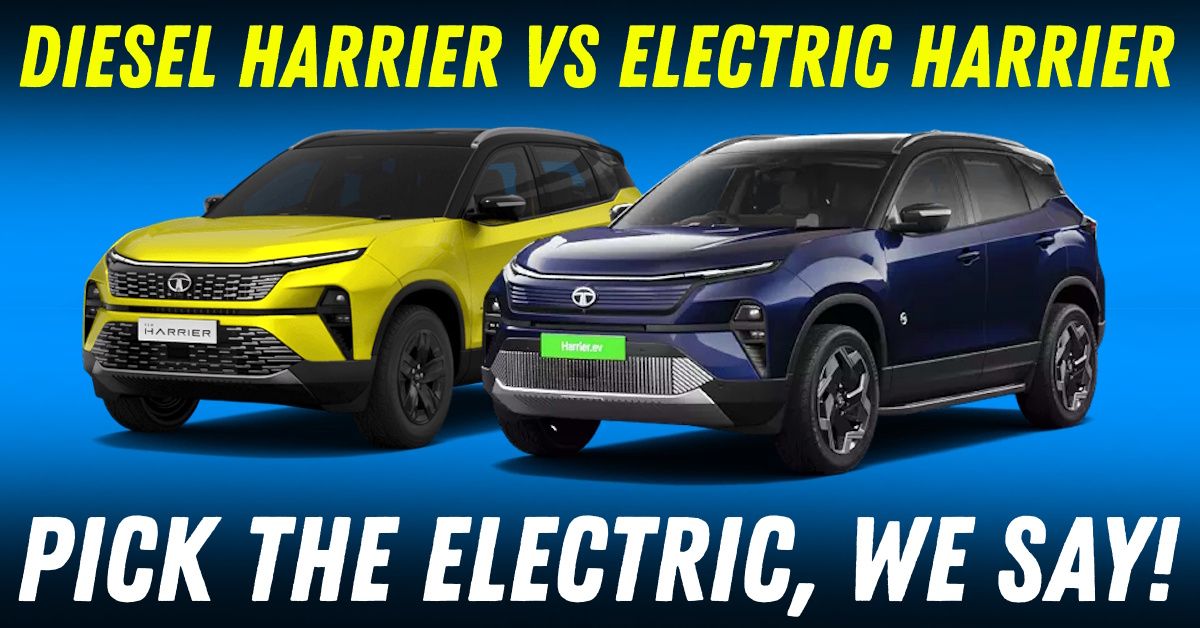Buying The Tata Harrier EV Makes More Sense Than The Diesel Harrier: We Explain


Tata Motors has expanded the powertrain choices of the Harrier SUV, by adding an EV version to the lineup. It seems to be a solid product and the strong pricing makes it even more compelling. Interestingly, buying the electric now makes more sense than buying the diesel! Let's delve into the details...
Tata Motors has been quite aggressive with the Harrier.EV's pricing. There is clear price parity between many variants of the Internal Combustion Engine (ICE) and EV forms- talking about the ex-showroom prices alone. The real difference, however, lies in the on-road prices, which is what actually matters to the end customer. Let's understand this with an example.
The diesel-powered Harrier is priced from Rs 14.99 lakh, ex-showroom and goes up to Rs 26.50 lakh (ex-showroom) for the range-topping Fearless Plus Stealth AT. Let's consider the Fearless Plus AT, which tops the range, but isn't really a special edition.
This means that it has all the features and equipment and a price that justifies the package better- Rs 24.34 lakh (ex-showroom). Let's pit this against the Empowered 75 RWD variant of the Harrier.EV which commands an ex-showroom price of Rs 27.49 lakh.
For a customer who is in the market for these, the diesel Fearless plus AT would attract RTO charges of Rs 3.1 lakh, and an insurance amount of Rs 1.3 lakh. The on-road cost- the actual amount of money that a customer in Mumbai would pay for this would be around Rs 28.7 lakh!
As part of the governmental push for EV adoption, many states offer incentives and subsidies on electric cars and SUVs. The Empowered 75 variant of the Harrier.EV with modern tech like level-2 ADAS and a 75 kWh battery pack, will only attract an insurance of 1.3 lakh and individual registration charges amounting to Rs 12,240. This brings the on-road price to Rs 29.1 lakh in Mumbai! Clearly, the difference between the on-road prices of the top-spec variants of the diesel and EV forms of Harrier is negligible!
Now, for someone who isn't specific about having ADAS and other such tech in his car, the Fearless Plus trim makes a lot of sense. The Fearless+ 75 with AC fast charging has an ex-showroom price of Rs 25.49 lakh. With the insurance and other charged included, the on-road price for this variant in Mumbai could be just around Rs 26.9 lakh- almost 2 lakh rupees cheaper than the range-topping diesel Harrier!
These are, but acquisition costs alone. The diesel Harrier houses a 2.0L turbocharged engine under its hood, which let's say, returns an average fuel efficiency of 11 kpl. A tank of fuel (50L) usually returns a range of around 550-600 km. The EV, with its 75 kWh battery pack, claims a range of 627 km on the Rear Wheel Drive (RWD) variant.
This upper hand in range can also mean financial savings in the long run. At the time of writing this article, diesel costs Rs 90.03 per liter in Mumbai. DC fast charging rates range from Rs 15 to Rs 24. This should help you get a hang of the running costs.
We would say none! The Harrier.EV's Fearless Plus 75 variant comes better equipped than the diesel Harrier's Fearless Plus AT! Even the infotainment screen size is the same. Most other kit levels are comparable as well. There's no change in the safety suite offered either.
In terms of performance, however, the EV feels much more fun to drive than the diesel. The diesel Harrier feels like a conventional SUV to drive. It has 170PS and 350 Nm on offer. The torque, however, comes in a linear fashion. The automatic gearbox feels seemless with its shifts.
The Harrier.EV, on the other hand, elevates the experience. It has 238hp and a full 500 Nm of torque on offer. Unlike the diesel that continues with a Front Wheel Drive layout, it gets a Rear Wheel Drive. It is definitely more fun to drive and as easy to use in the city as a regular automatic Harrier. Choosing for the Empowered 75 will only make things better due to its longer feature list.
To further boost customer confidence, Tata Motors is also providing a lifetime warranty on the Harrier.EV's battery packs. It stays valid for a period of 15 years from the date of registration. There is no kilometre cap on this.
This is, however, valid only for the first owner of the vehicle. The second or subsequent owner will only get only the battery pack's warranty- usually 10 years or 2 lakh kilometers.
The only reason to think twice about taking the EV route could be the general downtrend in the resale value of electric vehicles. Due to various reasons, the pre-owned EV market has alarmingly low prices for most cars and brands.